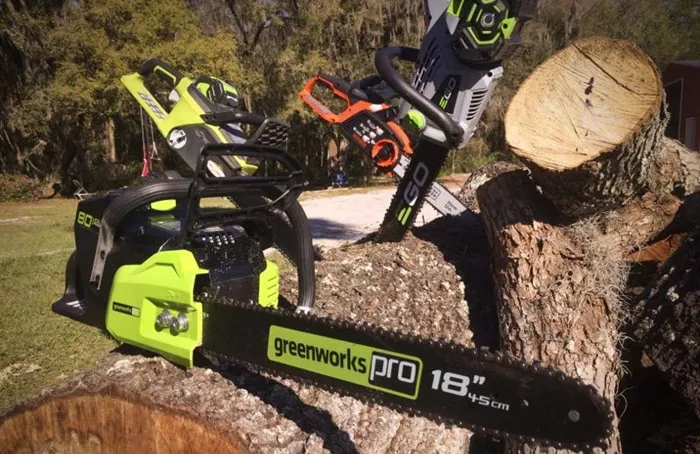When considering a chainsaw for your yard work or professional tasks, the Greenworks chainsaw is a popular choice. Known for its eco-friendly design and efficiency, it’s important to weigh its performance, advantages, and potential drawbacks. This article explores whether the Greenworks chainsaw is worth the investment, providing a comprehensive look at its features, pricing, and user feedback.
Product Overview
The Greenworks chainsaw is a cordless electric tool designed for those who prefer a quieter, more environmentally friendly alternative to gas-powered chainsaws. It is part of Greenworks’ lineup of battery-operated outdoor tools, which are known for their reliability and low maintenance. Key features of the Greenworks chainsaw include:
Battery Power: Runs on a rechargeable lithium-ion battery, offering convenience without the need for gas or oil.
Automatic Chain Oiler: Ensures the chain remains lubricated for smoother operation.
Tool-Free Chain Tensioning: Allows for easy adjustments to the chain without additional tools.
Lightweight Design: Makes it easier to handle and maneuver, reducing user fatigue.
This chainsaw is designed for light to medium-duty tasks, such as trimming branches and cutting small to medium-sized logs.
Advantages and Disadvantages of Greenworks Chainsaw
Advantages
Eco-Friendly Operation: Being electric, the Greenworks chainsaw doesn’t produce emissions, making it a greener choice compared to gas-powered models.
Low Noise Levels: It operates quietly, which is beneficial for residential areas and late-night projects.
Ease of Use: The lightweight design and tool-free chain tensioning make it user-friendly, especially for beginners.
Low Maintenance: With no need for gas, oil changes, or spark plug replacements, maintenance is minimal.
Disadvantages
Limited Power: While sufficient for light to medium tasks, it may struggle with larger, tougher cuts compared to gas-powered chainsaws.
Battery Life: Battery runtime can be limited, especially on higher settings or with more intensive tasks. This may require frequent recharging or having extra batteries on hand.
Cutting Capacity: The bar length and cutting capacity might not be suitable for larger logs or heavy-duty tasks.
Initial Cost: The upfront cost can be higher compared to some gas models, though this is offset by the lower long-term maintenance costs.
See also: Top 5 Chainsaw Sharpeners Reviewed And Rated
Comparison with Competitors
When comparing the Greenworks chainsaw to competitors, several aspects stand out:
Greenworks vs. DeWalt: DeWalt also offers high-quality battery-powered chainsaws. DeWalt’s models often provide similar power and features but might have a slightly higher price. Greenworks chainsaws generally offer better value for those focused on affordability and eco-friendliness.
Greenworks vs. Black+Decker: Black+Decker’s chainsaws are known for their affordability and decent performance. Greenworks typically provides longer battery life and slightly more power, making it a better choice for more demanding tasks.
Greenworks vs. Echo: Echo’s gas-powered chainsaws are renowned for their power and durability. However, Greenworks chainsaws excel in quieter, cleaner operation. Echo models might be better for heavy-duty work, while Greenworks is ideal for lighter, everyday use.
Specific Prices
Pricing for the Greenworks chainsaw varies based on model and features:
Basic Models: Start around $150 to $250. These typically include the chainsaw with a standard bar length and basic features.
Advanced Models: Range from $250 to $400. These might offer larger bar lengths, additional battery options, or advanced features.
Prices can fluctuate depending on sales, promotions, and retailers.
See also: ECHO Chainsaws: Unleashing Power And Precision In 2024
Purchase Recommendations
Here are some tips to consider when buying a Greenworks chainsaw:
For Homeowners: If you need a chainsaw for occasional yard work and light cutting tasks, a basic Greenworks model will likely meet your needs.
For Regular Users: Consider investing in an advanced model with a larger battery capacity if you frequently tackle more demanding tasks.
Battery Considerations: If you plan to use the chainsaw extensively, purchasing an additional battery can ensure you have enough power for longer projects.
FAQs
1. Is the Greenworks chainsaw powerful enough for heavy-duty tasks?
The Greenworks chainsaw is best suited for light to medium-duty tasks. For heavy-duty work or larger logs, a gas-powered chainsaw might be more appropriate.
2. How long does the battery last?
Battery life varies depending on the model and the intensity of use. On average, you can expect about 30 to 60 minutes of runtime. Having an extra battery can help if you have longer tasks.
3. How do I maintain the Greenworks chainsaw?
Maintenance is relatively simple. Regularly check and refill the chain oil, ensure the chain is properly tensioned, and clean the tool after use. There are no gas or oil changes needed.
4. Can I use the Greenworks chainsaw in all weather conditions?
The chainsaw is designed for outdoor use but should be used in dry conditions. Avoid using it in heavy rain or extreme weather to ensure optimal performance and safety.
5. Where can I buy the Greenworks chainsaw?
The Greenworks chainsaw is available at major retailers like Home Depot, Lowe’s, and online through platforms such as Amazon and the official Greenworks website.
Conclusion
The Greenworks chainsaw offers a solid blend of performance, convenience, and environmental benefits. It’s ideal for homeowners and light users who appreciate a quieter, cleaner alternative to gas-powered models. While it may not be the best choice for heavy-duty tasks, its ease of use, low maintenance, and eco-friendly operation make it a worthwhile investment for many users. By considering your specific needs and the insights provided, you can determine if the Greenworks chainsaw is the right tool for your projects.
Related Topics:
-
Milwaukee Polisher Performance Analysis: What You Need To Know Before Buying
-
A Review Of Kreg Tools: Performance, Durability, And User Experience
-
Chicago Electric: The Ultimate Guide To Their Best Power Tools
-
Evaluating The Top Insoles For Work Boots: Comfort, Durability, And Value

